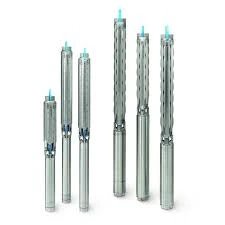Nov . 07, 2024 11:36 Back to list
Submersible Water Pumps for Deep Bore Wells Efficient Water Extraction Solutions
Deep Bore Well Submersible Water Pumps A Comprehensive Overview
In recent years, the demand for reliable water supply solutions has surged, especially in rural and semi-urban areas where surface water sources may be scarce or unreliable. One of the most effective technologies for accessing underground water is the deep bore well submersible water pump. This article explores the functionality, benefits, and considerations surrounding these essential devices.
What is a Deep Bore Well Submersible Water Pump?
A deep bore well submersible water pump is a type of pump designed to operate underwater, typically in deep bore wells. Unlike traditional pumps that sit above ground, submersible pumps are submerged in the water source, effectively pushing water to the surface through a series of pipes. These pumps are characterized by their sturdy construction and ability to handle deep water levels, often reaching depths of over 300 meters.
How Does It Work?
The operation of a submersible pump is relatively straightforward. When the pump is installed in a bore well, it is connected to an electrical power source. Once activated, the pump's motor drives impellers, which create a centrifugal force that moves water upward through the pump and into the delivery pipeline. The design allows for efficient water extraction while reducing the risk of air lock, which can occur with conventional pumps.
Key Advantages
1. Efficiency Submersible pumps are known for their high efficiency in pumping water from deep sources. They require less energy to operate than surface pumps, making them a cost-effective solution in the long run.
2. Durability These pumps are designed to operate in harsh conditions, often featuring corrosion and abrasion-resistant materials. This durability ensures a long service life, even in challenging environments.
3. Space-Saving Design Because they function below the water table, submersible pumps do not occupy valuable surface space, allowing for more efficient use of the land.
deep bore well submersible water pump

4. Versatility Deep bore well submersible pumps can be used in a variety of applications, including agricultural irrigation, residential water supply, and industrial processes. Their adaptability makes them suitable for both large-scale and small-scale operations.
5. Reduced Noise Pollution Unlike surface pumps, submersible pumps operate quietly, minimizing noise pollution in the surrounding area, which is particularly beneficial in residential settings.
Considerations When Choosing a Pump
When selecting a deep bore well submersible water pump, several factors must be taken into account
1. Depth of the Well It's crucial to choose a pump that is capable of reaching the necessary water depth while delivering the required flow rate.
2. Power Source Most submersible pumps operate on electricity, but options are available that are powered by solar energy or generators, allowing for use in remote areas.
3. Pump Material The material of the pump's body and components should be considered, especially in relation to the water's chemical composition. Corrosion-resistant materials are recommended for longevity.
4. Maintenance Regular maintenance is vital to ensure the efficient operation of submersible pumps. Users should be aware of the maintenance requirements and the availability of service resources.
Conclusion
Deep bore well submersible water pumps represent an innovative solution for accessing groundwater efficiently and reliably. Their ability to operate in deep, challenging environments makes them indispensable for many agricultural, residential, and industrial applications. As the need for sustainable water supply solutions continues to grow, the role of submersible pumps will only become more prominent, supporting communities and industries in their quest for accessible and dependable water resources.
-
Submersible Water Pump: The Efficient 'Power Pioneer' of the Underwater World
NewsJul.01,2025
-
Submersible Pond Pump: The Hidden Guardian of Water Landscape Ecology
NewsJul.01,2025
-
Stainless Well Pump: A Reliable and Durable Pumping Main Force
NewsJul.01,2025
-
Stainless Steel Submersible Pump: An Efficient and Versatile Tool for Underwater Operations
NewsJul.01,2025
-
Deep Well Submersible Pump: An Efficient 'Sucker' of Groundwater Sources
NewsJul.01,2025
-
Deep Water Well Pump: An Efficient 'Sucker' of Groundwater Sources
NewsJul.01,2025
-
 Submersible Water Pump: The Efficient 'Power Pioneer' of the Underwater WorldIn the field of hydraulic equipment, the Submersible Water Pump has become the core equipment for underwater operations and water resource transportation due to its unique design and excellent performance.Detail
Submersible Water Pump: The Efficient 'Power Pioneer' of the Underwater WorldIn the field of hydraulic equipment, the Submersible Water Pump has become the core equipment for underwater operations and water resource transportation due to its unique design and excellent performance.Detail -
 Submersible Pond Pump: The Hidden Guardian of Water Landscape EcologyIn courtyard landscapes, ecological ponds, and even small-scale water conservancy projects, there is a silent yet indispensable equipment - the Submersible Pond Pump.Detail
Submersible Pond Pump: The Hidden Guardian of Water Landscape EcologyIn courtyard landscapes, ecological ponds, and even small-scale water conservancy projects, there is a silent yet indispensable equipment - the Submersible Pond Pump.Detail -
 Stainless Well Pump: A Reliable and Durable Pumping Main ForceIn the field of water resource transportation, Stainless Well Pump has become the core equipment for various pumping scenarios with its excellent performance and reliable quality.Detail
Stainless Well Pump: A Reliable and Durable Pumping Main ForceIn the field of water resource transportation, Stainless Well Pump has become the core equipment for various pumping scenarios with its excellent performance and reliable quality.Detail
